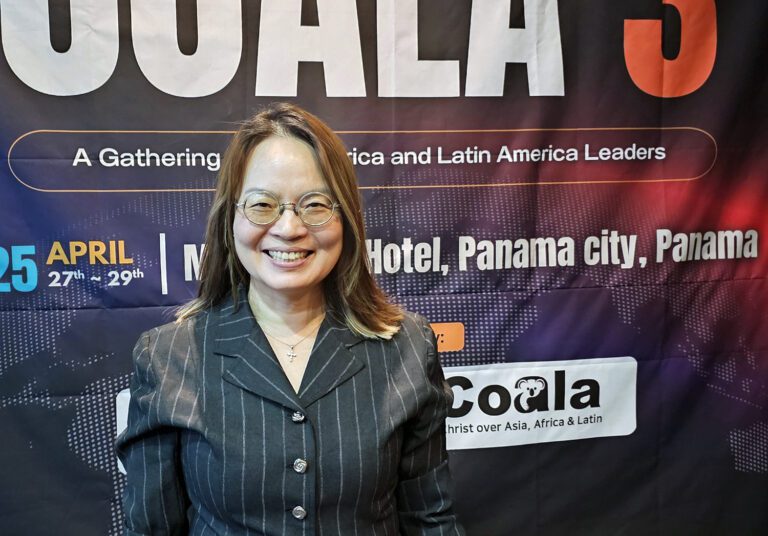Taiwanese pastor Hui Lang Wu is the young voice of leadership in the global mission, bringing a new perspective to Coala 3.0 this year. In an interview with Christian Daily International, she encouraged the inclusion of more women, young people and Chinese congregations in the future of global mission collaboration.
Serving as Minister at a local church in Taiwan and easily known in a Western setting under the name “Patricia,” Wu has worked for a long time with the younger generation, church planting initiatives and church revitalization efforts. She was ordained as a Taiwanese pastor. She said that women’s leadership in the church is not uncommon.
Her international connections in the church helped open the door to participation in Coala 3.0, a conference that brings together mission leaders from Christ across Africa, Latin America and Asia.
“Our church leaders have strong relationships with both English and Korean-speaking ministries,” Wu said. “They encouraged me to come and see it in Latin America, a place we often consider to be the “end of the earth.” ”
A new perspective on global missions
For Wu, a trip from Taiwan to Panama was more than just a geographical change. It was a deep encounter with new cultures, languages, and ways of collaboration.
“We are not that open about different languages in Taiwan,” she admitted. “I have experiences with eastern and Southeast Asians in Taiwan, and meeting Latin Americans was a refreshing and exciting experience.”
She praised the “beauty of God’s creation” reflected in cultural diversity, and emphasized the importance of learning to “dance with others” in mission work. It is often used to describe intercultural cooperation, which is frequently used in Coala 3.0.
Wu observed that while English is more familiar to Taiwanese Christians, he mainly observes that Spanish-speaking environments and that Coala 3.0 and Comibam Congress announced a “fresh, interesting, enthusiastic” challenge last week. Despite the language barrier, she paid attention to the hospitality and warmth of the participants. “Everyone makes you feel like you’ve known them for a long time.”
Learn from humility and collaboration
One of the most impressive elements of WU was the humility shown by the advanced mission leaders. “Most of the people here are top leaders of their organization, but they are very humble,” she said. “We could sit together, discuss and learn from each other.”
She contrasted this experience with her observations in Asian culture. In Asian culture, hierarchical structures often distracted senior leaders from younger voices. “Here the leader is like a friend. It’s beautiful.”
Wu said her experience with Coala 3.0 highlighted the value of intergenerational “coaching” relationships and the need to intentionally engage young participants in mission leadership.
Advocate for the role of women and young leaders
As a leader of young women invited to give a plenary presentation on Coala 3.0’s mission in East Asia, WU provided a unique perspective on the future of the conference.
“In some Asian cultures, female leaders are expected to be very strong and almost male-like or silent,” she explained. “But we don’t have to prove ourselves. We have a role to play. That’s important.”
WU highlighted the example of another female leader she praised at the meeting. “She played a key role simply by being herself,” Wu said. “It’s a powerful model for us.”
Wu also highlighted her belief in bringing in young participants from Taiwan and including them in their leadership experiences, making the next generation a pupil.
“Every day I listened to him and learned from him,” she said. “The younger generation has opinions and perspectives that we need to hear. We faced challenges together – even doing the laundry and preparing presentations, it builds real cooperation.”
She suggested that all senior leaders attending future koala meetings should bring at least one emerging leader to mentor through their experience.
“Teaching and engaging young leaders now makes it easier to move leadership later,” Wu said. “They will become leaders.”
Building a bridge between Asia and Latin America
Wu’s participation also highlighted the possibility of greater involvement among churches in Asia and Latin America, particularly Latin American Chinese-speaking congregations.
“Before I came, I didn’t think a lot would happen afterwards,” she admitted. “But there’s a lot we can do when we’re here.”
She has already begun sharing information about koalas with Chinese leaders who are known in Latin America and Taiwan, encouraging them to become involved. She envisions a future in which Latin American Chinese-speaking congregations are better represented in global mission discussions.
“There is a Chinese community in Latin America. Some speak Spanish, some speak Portuguese,” she said. “They should be part of this movement too.”
Wu hopes that future koala gatherings will increase diversity and bring together leaders from Latin American congregations in China, Taiwanese churches, and other Asian communities that are often underrepresented.
Looking forward to Coala 4.0
Looking back at the next step, Wu said he dreamed of a Kora that embraces “diversity of leaders and backgrounds” not only from nationality but also from an age and gender perspective.
She also recommended the creation of specific tracks or workshops designed for emerging leaders and younger participants, allowing them to be meaningfully involved even if they are unable to attend a full meeting schedule.
“Most senior leaders are very busy,” she admitted. “However, including young leaders, even in parts of the program can have a huge impact.”
For WU, her time with Coala 3.0 has been transformative, both personally and in her hometown.
“I might not be the most important person,” she said. “But God has given me a connection. If I were to be a bridge, it would be beautiful.”
Her hope is that her experiences allow others, especially women and young Christians, to see themselves as silent players or secondary companies on global missions, but as essential contributors to the narrative of the development of God’s work in countries.
“The mission requires all generations,” Wu said. “And we need to hear everything.”
